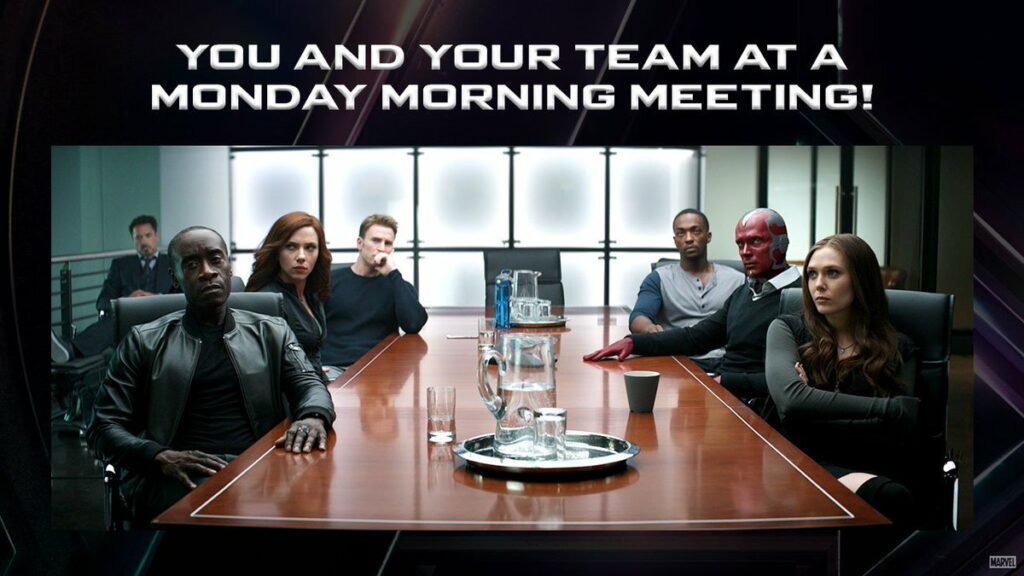
Dan Humbert is the Product Strategy Director at Varis. He’s managed large teams, launched huge products and runs many, many, meetings.
We’re Still Searching for the Meaning of Meetings
I heard it again just the other day: “Meetings are such A. Waste. Of. Time.”
I decided to Google that phrase to see how common it is – and got as far as typing “Meetings are…” before it had completed my search term for me and let me know there were over 192 million concurring opinions. It would appear the topic may be on the minds of others as well…
But before I add my voice to those 192 million others, how many times have you also heard that one of the keys to success in business is collaboration? And for what it’s worth, our friends at Google report that “Collaboration in Business” rates over 628 million hits…more than 3 times as many as the anti-meeting crowd does.
Also Read: A Complete Guide: Planning a Decision Making Meeting
While I doubt there is any debate that there are many unproductive, unnecessary, and frankly dysfunctional meetings that occur every day, we also know that productive meetings can build relationships, align people and processes, and accomplish goals faster and more effectively.
Identifying the Real Problems with Meetings

I propose that most meetings do not have to inevitably be ‘bad’. Instead, those that do may often be the unintended consequence of some of their participants. So maybe the question should not be “why do meetings waste my time” and instead should be “am I wasting our time by making a good meeting go bad”?
At this point you could be excused for thinking “wait a second, why are you labeling me the bad guy here? I’m not the one who called the meeting…”
True – you’ll get no argument from my corner that some meetings are conceived, hatched, and unleashed upon the world from the onset as unproductive. But not all of them – and not even most of them.
A specific case in point I recall discussing with a former colleague: She was part of a team that was coordinating the release of an important new product, and had set up a 30-minute standing meeting to coordinate the myriad of inter-dependent tasks across departments as well as the resolution of issues as they arose. The team was geographically dispersed, and she had set up a conference call-in # for everyone to use. I was one of those attendees.
The first few weekly meetings ran like clockwork: they started and ended on time, and actual team progress lined up favorably against her schedule. Then, perhaps because we started so well, we got lazy.
Also Read: Series: Powerful Meeting Lessons from Leaders [How Begin/Brzezinski Found Common Ground]
I could go on about the variety of bad behaviors that became common – the late entrants who invariably interrupt the meeting with the obligatory “sorry I am late – my prior meeting ran long!” apology/statement, the senior exec who hijacks the meeting with some curveball question, the “multi-tasking” email composer clicking away on their noisy keyboards, those of us who revisit asked-and -answered questions from prior meetings, and the ever progressing clock that cues some participants to interrupt each other as they exit saying something to the effect of “thanks, this is important – but I am going to have to drop now, because I have to” (wait for it….) “…go to another meeting”.

We’ve all been there, haven’t we?
Maybe you were rescued by a super-talented, superhero meeting owner – someone who kept the meeting moving forward with the perfect balance of spunk, passive aggressiveness, and legitimate talent that no one could hide from. Wish that was a skill that LinkedIn could certify.
But if not, by the end of the meeting, maybe all that’s left is a dead phone line/internet connection/meeting room, our heroic meeting owner cursing their tattered and unmet meeting objective, and a bunch of grumpy participants that are now IM’ing that head-banging-on-the-desk emoji to participants (something I would never dream of doing…)
So – Bad Meeting? Or Bad Meeting Attendees?
I vote the later. Yes, good, productive meetings need lots of things to be in place besides super-talented, superhero meeting owners. Others more qualified than I have made careers figuring out all the different ways those can be achieved: creating a clear objective, treating meeting time like a cost, starting/ending on time, limiting their number and who can call meetings, etc. I find myself nodding my head every time I hear these.

The Power of Meetings is Collaboration
But perhaps two additional ingredients are missing from all those improvement tactics: 1) a shared acknowledgment that meetings can be the most effective way to collaborate, whether that collaboration is to inform, research, brainstorm, etc. And 2) if we can acknowledge THAT, then perhaps we can approach our next meeting knowing each of us are responsible to use our collective time respectfully and purposefully.
Just as a square must be a rectangle, but a rectangle is not necessarily a square, ‘collaboration’ and ‘meetings’ are not interchangeable. But I find real collaboration often requires working in real-time with others and when you get there, it is worth it.
And especially in this time of remote and/or dispersed workforces, it’s not uncommon for the most effective way to get to that goal of real collaboration, whether virtually or in person, is through a meeting.






